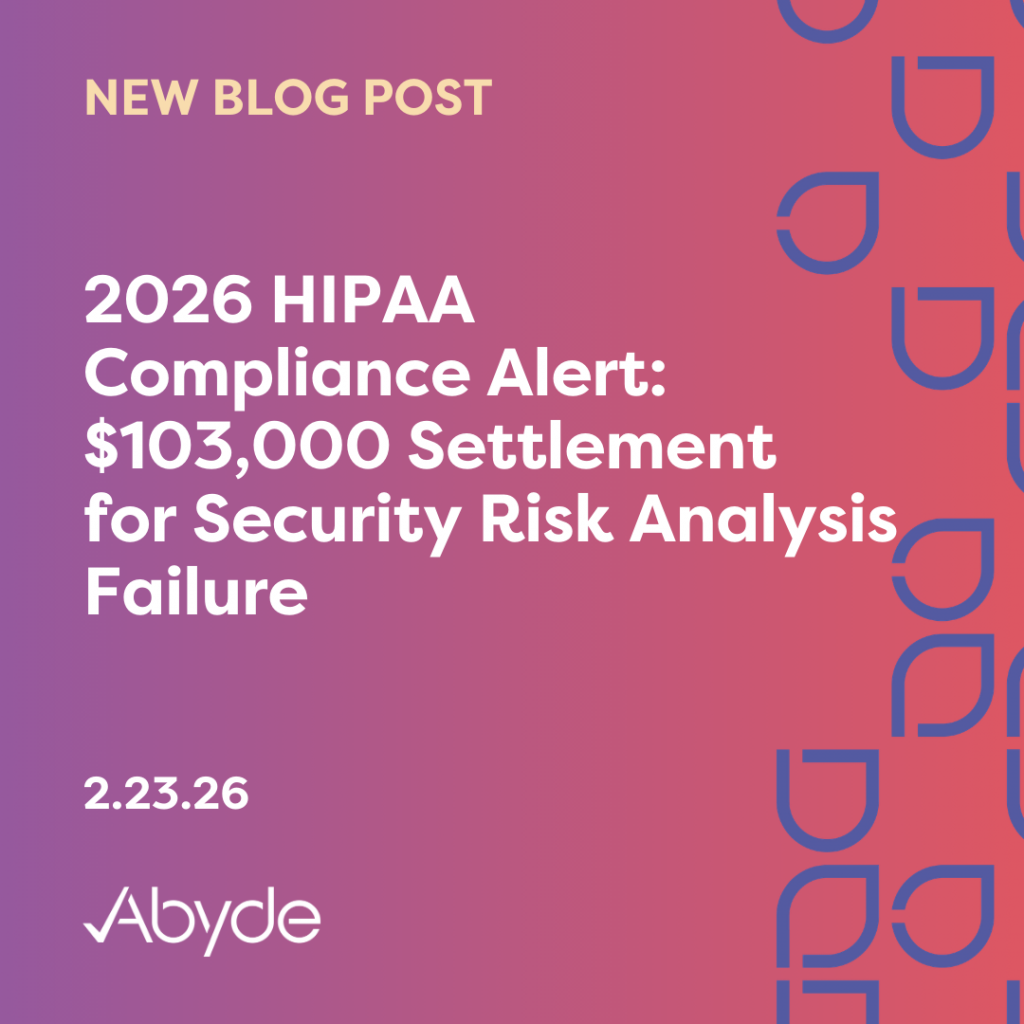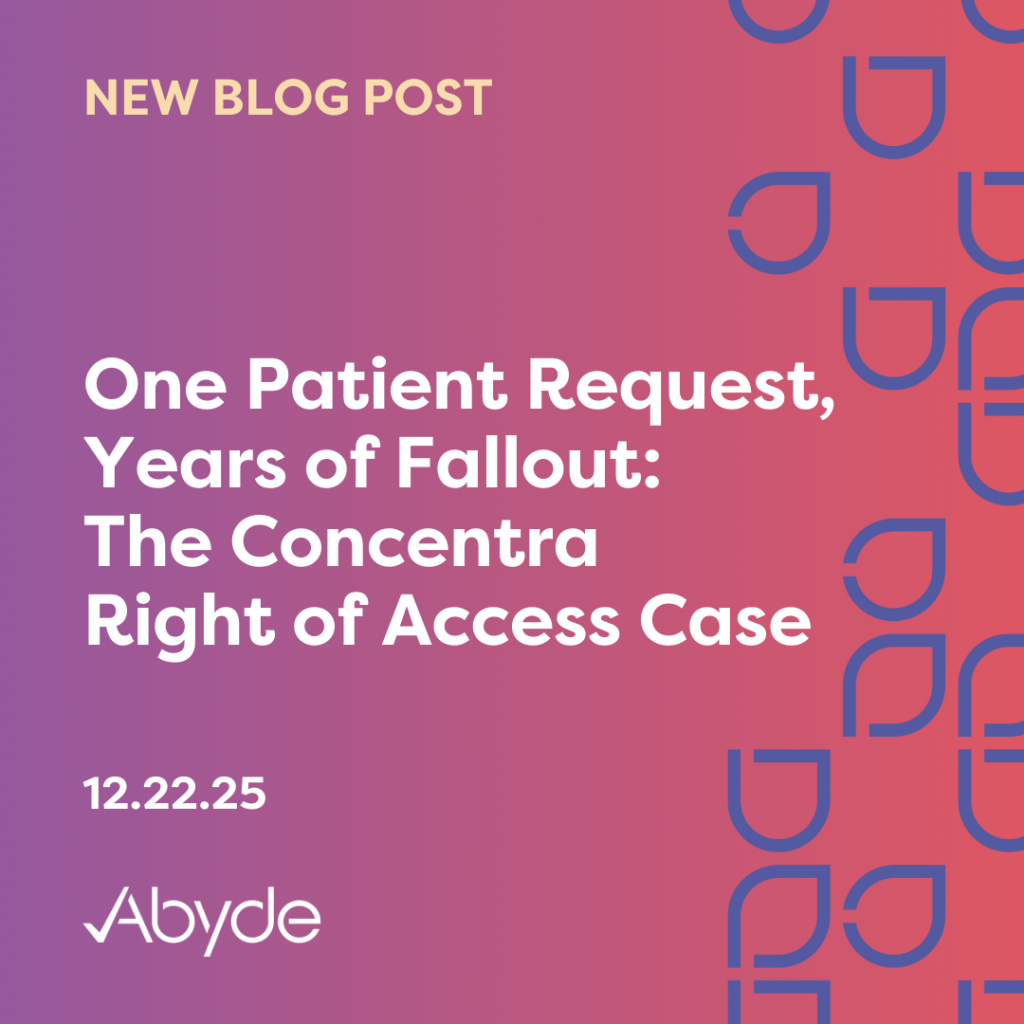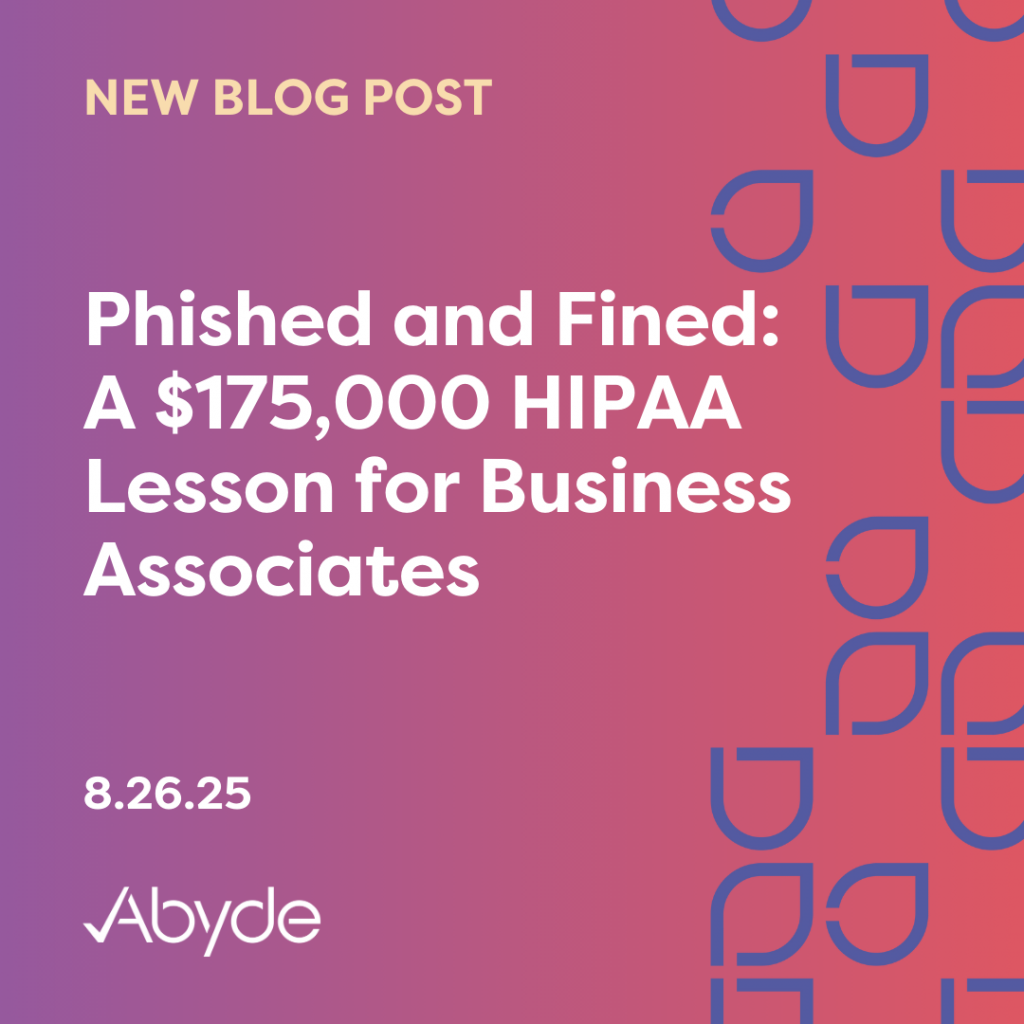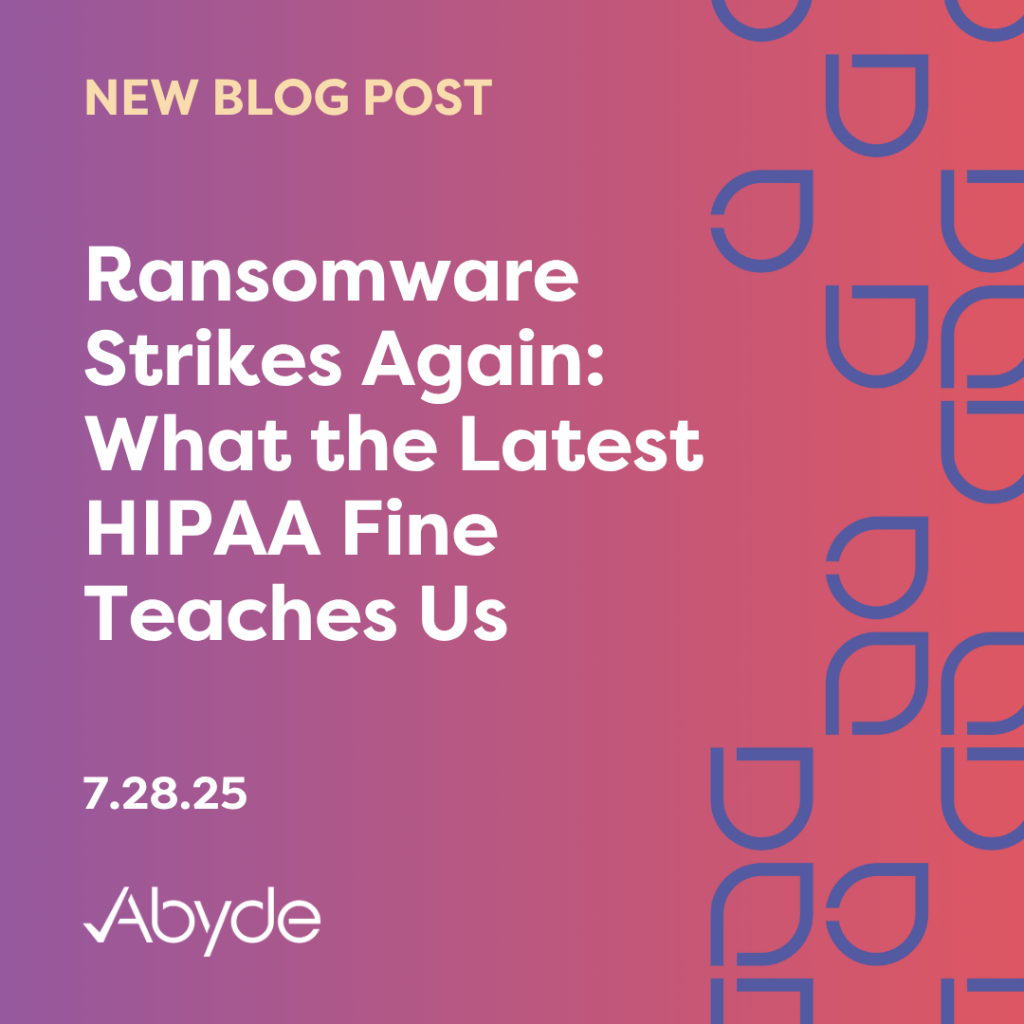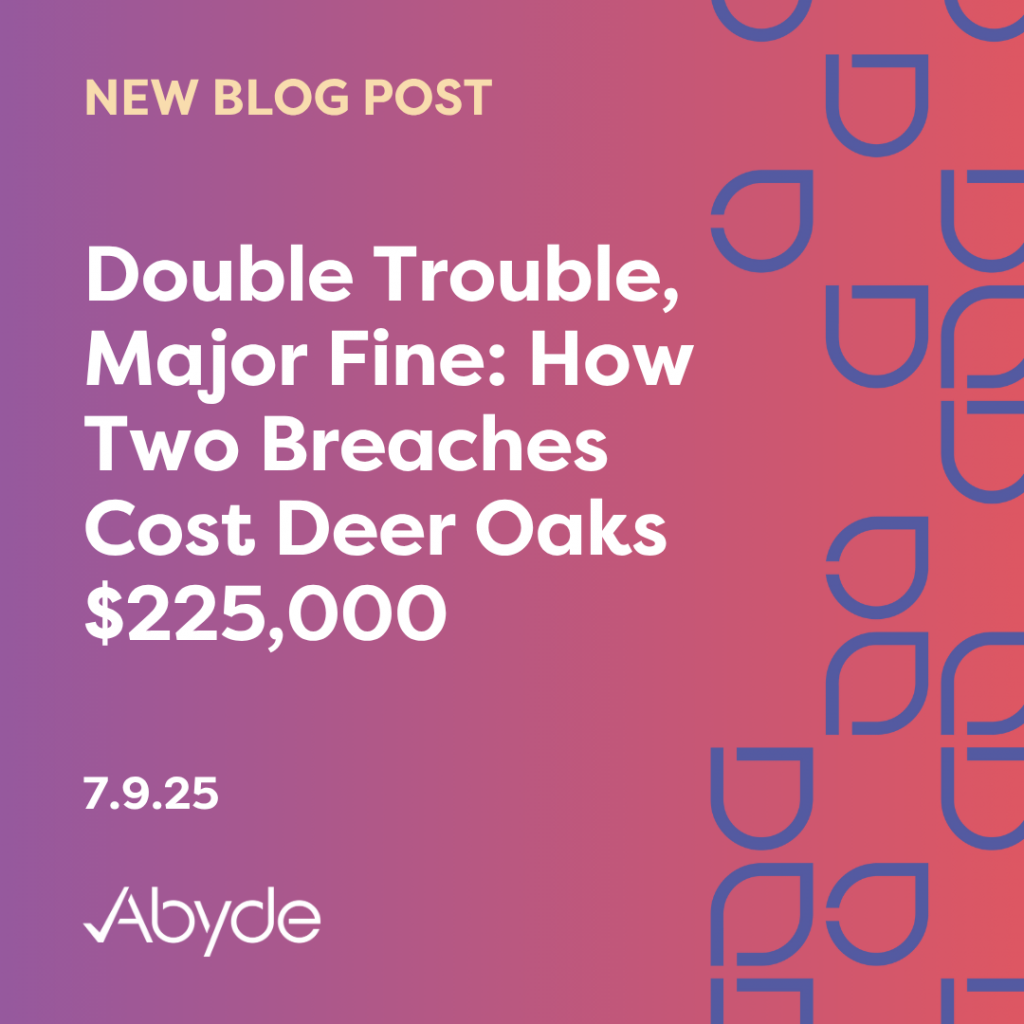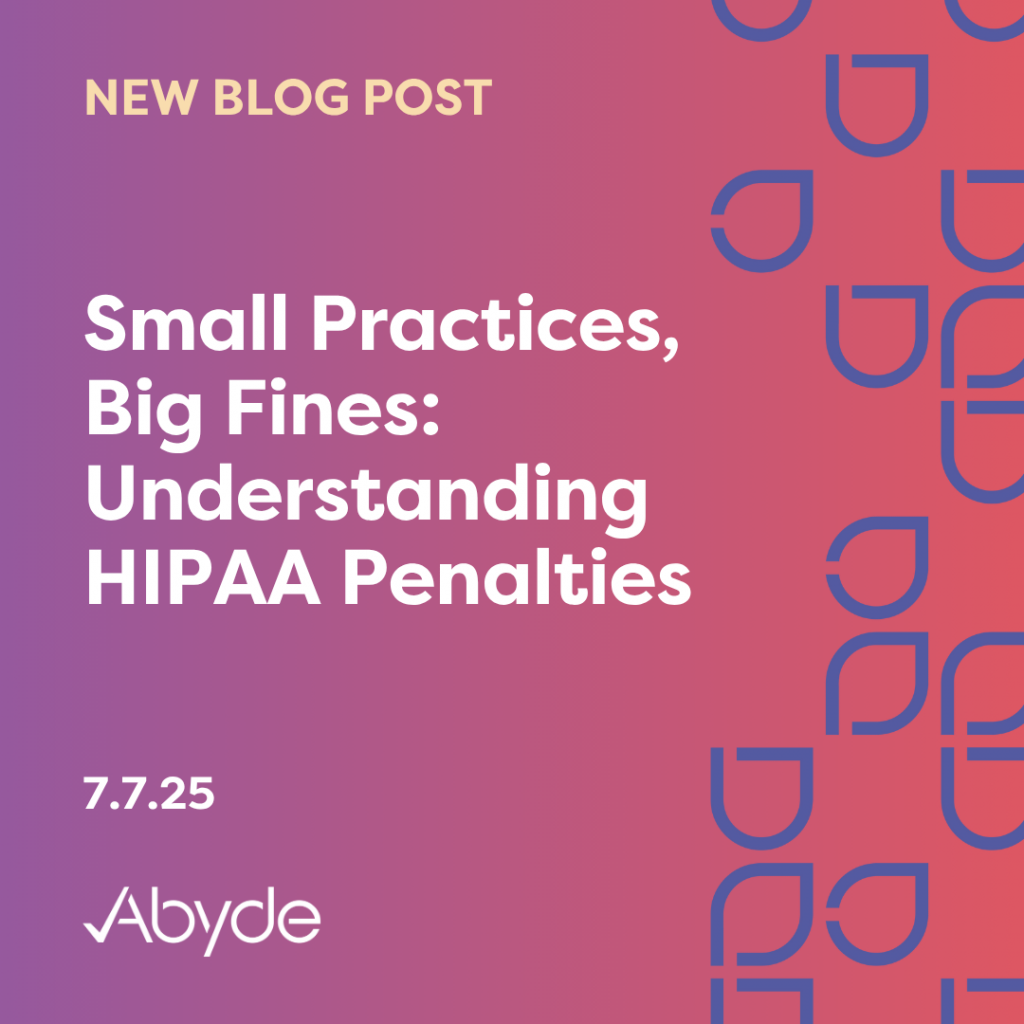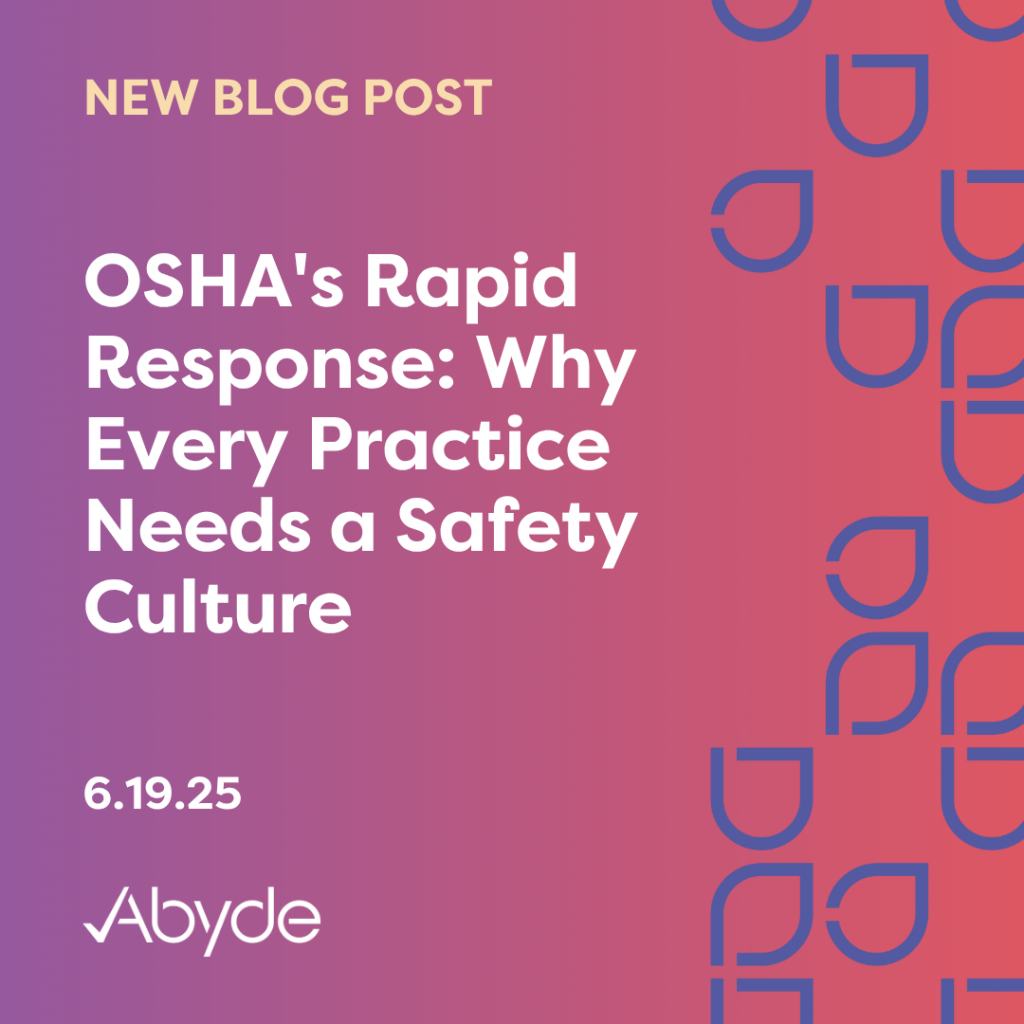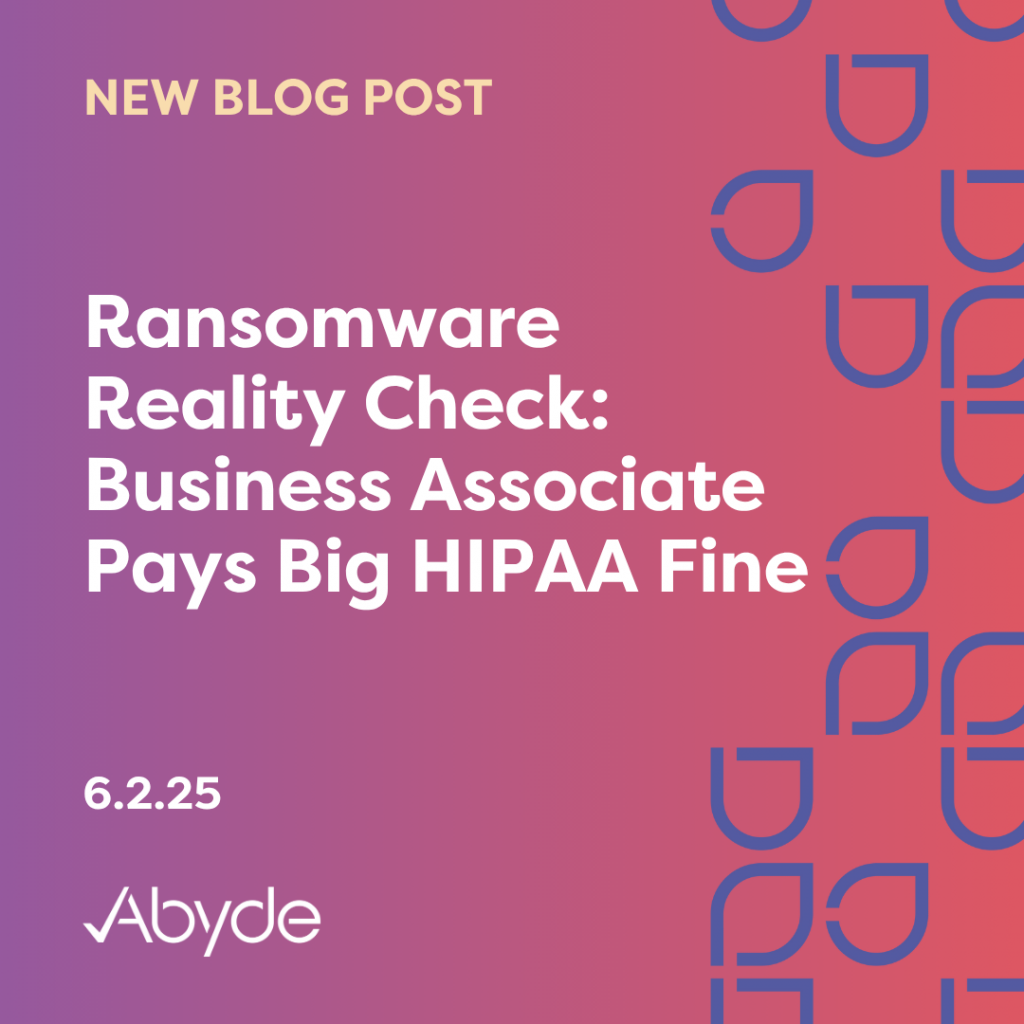February 23, 2026 The Office for Civil Rights (OCR) is back with a massive settlement to start 2026. A rehab center in Illinois, Top of the World Ranch Treatment Center (TWRTC), recently agreed to a $103,000 and 2-year Corrective Action Plan (CAP) settlement following a security breach that exposed major security vulnerabilities. This settlement is also the 11th enforcement of the Risk Analysis Initiative. The Top of the World Ranch Treatment Center HIPAA settlement was announced just days after the OCR officially enacted the Part 2 changes to the Notice of Privacy Practices. As of Feb 16, all Covered Entities, regardless of scope of practice, must update their Notices of Privacy Practices (NPP) to include special provisions regarding the handling of Substance Use Disorder (SUD) Protected Health Information (PHI). What Happened? In March 2023, an employee’s email account was compromised in a phishing attack, exposing fewer than 2,000 records. In the world of healthcare data breaches, where numbers often reach the millions, this was a relatively small but still severe incident. However, the OCR’s enforcement was not based on the size of the breach, but on missing paperwork. This breach report initiated an investigation that led the OCR to find the SUD facility had failed to complete a compliant Security Risk Analysis (SRA). The SRA is the foundation of a HIPAA-compliant practice and an extensive assessment of the potential vulnerabilities your practice might face. The SRA reviews the administrative, physical, and technical safeguards your practice must have in place. Since TWRTC hadn’t completed this proactive assessment, they missed the specific vulnerabilities in their technical defenses that eventually allowed a phishing email to succeed. The Bottom Line The Top of the World Ranch Treatment Center HIPAA settlement proves that the OCR doesn’t punish based on how ‘big’ a mistake is, but for a lack of preparation. Breaches happen, but your team’s readiness and response are what determine whether you face an enforcement action. You might think your practice is too small to be a target, but this settlement shows that if you have a breach, no matter the size, the first thing the OCR will ask for is your SRA. If you don’t have it, the legal repercussions could be far more painful than the breach itself. Is your SRA current for 2026? If not, meet with our team of experts today to get compliant.
One Patient Request, Years of Fallout: The Concentra Right of Access Case
December 22, 2025 Well, the Office for Civil Rights (OCR) is back, folks! After a historic government shutdown, the OCR has announced its first fine. The recipient of the latest fine is Concentra, Inc., a Texas-based enterprise healthcare provider. While this health organization might have numerous locations, the root of this federal fine and years of legal battles stems from one patient complaint to the OCR. With the 21st fine of the year, we’re taking it back to the basics: Patient Right of Access. What Happened? In February 2018, a patient requested a copy of their medical and billing records from Concentra’s Peoria, Arizona, location. While a Concentra employee forwarded the request to the billing office, the patient did not receive their medical records in a timely manner. The patient sent several requests throughout the year. In October 2018, Concentra’s Business Associate issued an invoice to the patient for $82.57 for the requested medical records. This amount was disputed. After months of back-and-forth with Concentra, in December 2018, the patient filed a complaint with the OCR regarding how the healthcare provider handled their record request. Finally, in March 2019, over a year after the initial request, Concentra’s Business Associate provided the health records to the patient for an adjusted rate of $6.50. Providing the records was just the beginning for Concentra. In the summer of 2020, the OCR notified the healthcare provider that this case indicated noncompliance with the Privacy Rule and provided Concentra with the opportunity to submit mitigating evidence. Then, in 2021, the OCR proposed to levy a $250,000 penalty. After several more years of legal battles, the OCR settled this case in 2025 with a $112,500 settlement. Patient Right of Access 101 This lengthy chain of events highlights the importance of promptly and thoroughly addressing patient requests. Detailed in the Privacy Rule, patients have the right to access their health records within 30 days from the initial request, known as the Right of Access. This timely access empowers patients to make informed decisions about their healthcare. This 30-day timeline applies on the federal level. Depending on the state, your practice may be required to comply with more stringent timelines, as seen in California. The 30-day timeline is firm, and a practice can only be granted an extension once, for an additional 30 days. In addition to adhering to a 30-day timeline, the fees for copies of records must be reasonable and feasible. The acceptable fee for providing copies of documents is limited to the cost of labor for copying, supplies, postage, and any provided summary. Alternatively, your practice can charge a flat fee of not more than $6.50 instead of calculating these specific costs. Keeping Your Practice Compliant (And Your Patients Happy) While following the Right of Access might seem straightforward, it’s one of the most common HIPAA violations practices make. There have been 50+ HIPAA Right of Access enforcement actions levied by the OCR. With the right compliance program, you can ensure that your staff is aware of all requirements when handling patient requests. Clear policies and engaging training help you respond correctly, on time, and with confidence. Ready to ensure your practice is HIPAA compliant? Schedule a consultation with one of our compliance experts today.
From Success Stories to HIPAA Violations: Cadia Healthcare’s $182K Lesson
October 6, 2025 Remember: sometimes, it’s not your story to tell. While your practice might be excited to share the positive results of quality patient care, it’s your patients’ right to share their stories. Patients’ medical histories and treatment plans are considered Protected Health Information (PHI), and it’s your practice’s responsibility to safeguard all sensitive patient data. Cadia Healthcare Facilities is the latest rehabilitation organization caught in the Office for Civil Rights’ (OCR) crosshairs after improperly disclosing patient health stories online. Notified by a patient complaint, the OCR investigated the organization and settled the violation with a $182,000 fine and a two-year Corrective Action Plan (CAP). A major financial and reputational hit, paired with thorough government monitoring, is a lesson learned for the organization. The 20th fine of the year teaches healthcare practices the importance of HIPAA-compliant marketing, website management, and patient consent. What Happened? The rehabilitation organization implemented a Success Story section on its site, with 150 patients’ stories publicly highlighted on the page. This page had extensive PHI, including a patient’s name, image, conditions, treatment, and recovery plans. While Cadia Healthcare Facilities utilized the website with good intentions, these Success Stories quickly turned into HIPAA horrors. The reason why? Missing HIPAA authorization forms for all 150 featured patients. Then, a patient contacted the OCR with concerns about their image being used without permission on the Cadia Healthcare Facilities website. That’s when the OCR discovered the rehabilitation organization’s noncompliant website and impermissible disclosures. In addition to the fine and government monitoring, the organization must notify all impacted patients that their information was breached on its site, per the Breach Notification Rule. Share Online Compliantly Posting your practice’s accomplishments online might be exciting, but your practice must handle it carefully. Your practice must obtain a HIPAA authorization form before publicly sharing patients’ PHI. This includes before-and-after photos, testimonials, and, in this case, success stories. The forms must be written and specific, and patients can withdraw permission at any time. Your practice’s online presence is likely a new patient’s first impression, so it’s essential to maintain and update your webpage. However, having more likes and views should never outweigh your commitment to compliance and patient protection. Are you confident your staff understands how HIPAA compliance extends to social media and other forms of marketing? With smart software, your practice can easily train and provide staff with the required documents for HIPAA-compliant social media use. The right compliance solution will empower your staff to handle HIPAA compliance with ease, allowing them to build an online presence while keeping patient data safe. To learn more about HIPAA compliance for your practice, meet with a compliance expert today.
Phished and Fined: A $175,000 HIPAA Lesson for Business Associates
August 26, 2025 When scrolling through your inbox, letting your guard down is easy. Maybe you click on that email that looks like it’s from your bank without hesitation, or are swayed by the unsolicited message for a random all-expenses-paid trip. Unfortunately, phishing emails are everywhere, and they target the healthcare industry due to the sensitive nature of Protected Health Information (PHI). BST & Co., CPAs, LLP, known as BST, is a victim of phishing scams. The New York accounting and consulting firm, which works with practices, received the latest HIPAA enforcement, with a $175,000 fine and a two-year Corrective Action Plan or close monitoring by the Office for Civil Rights (OCR). The OCR discovered, after the fallout of a phishing email, that the Business Associate (BA) had failed to complete a Security Risk Analysis (SRA). This is the 10th enforcement of the Risk Analysis Initiative since its introduction last year. An SRA is a requirement for all HIPAA-regulated entities to assess all potential vulnerabilities of any physical, technical, or administrative safeguard in their organization. By identifying any concerns before a breach occurs, organizations are able to better safeguard PHI, keeping both their business and patients safe. This fine reminds us that BAs are just as responsible for upholding HIPAA as traditional medical practices and that completing the SRA is paramount. What Happened? On December 4, 2019, malware entered BST’s network after a successful phishing attempt. From December 4 to December 7, 170,000 patients’ PHI was exposed. The OCR began its investigation after BST reported the breach in February 2020. The OCR discovered that BST had not completed a thorough SRA. With a thorough SRA, BST could have seen the vulnerabilities regarding emails, or even how they secured Covered Entities’ PHI, and either prevented this breach or minimized its impact. Compliant Business Associates Keep Patients Safe Even though BST wasn’t treating patients directly, as an accounting and consulting firm they still had access to a Covered Entity’s PHI. That’s a clear reminder of just how important it is to make sure your Business Associates (BAs) are fully compliant. When your BA follows a comprehensive HIPAA compliance program, your practice gains peace of mind and a stronger, more secure partnership. The right solution helps you stay ahead of your BA responsibilities, whether that’s generating and maintaining Business Associate Agreements, providing staff training with practical tips like email safety, or completing a Security Risk Analysis (SRA) to uncover hidden risks. Connect with our team of compliance experts today to learn more.
Ransomware Strikes Again: What the Latest HIPAA Fine Teaches Us
July 28, 2025 Healthcare’s cybercrime nightmare just got more expensive. With over half a million dollars in fines and the second HIPAA ransomware fine issued this month alone, it’s time to acknowledge the serious threat cybercrimes pose to healthcare. The Office for Civil Rights (OCR) just announced its latest HIPAA fine, following a ransomware attack affecting a surgery center in New York, totalling $250,000 and placing the practice under a two-year Corrective Action Plan (CAP). The two-year period includes constant government monitoring, ensuring the healthcare provider has taken action to mitigate risks and secure Protected Health Information (PHI). Here’s where things get interesting. Upon further inspection, the exact ransomware variant, PYSA, explicitly targets the healthcare industry. Think about it: cybercriminals know the absolute treasure trove of sensitive patient data a healthcare organization holds. As malicious actors know the importance of patient health records, your practice must be extra vigilant when handling PHI. What Happened? In March 2021, an unauthorized actor gained access to the networks of Specialty Surgery Center of Central New York (also known as Syracuse ASC, LLC). The hacker deployed ransomware in the organization’s networks for over two weeks. This ransomware exposed nearly 25,000 patient records, with access to Social Security numbers, addresses, health histories, and more. Syracuse ASC, LLC, notified the OCR of this breach in October 2021, over six months after the initial intrusion. This wait violated the HIPAA Breach Notification Rule. Given the massive breach, the healthcare provider had to notify the OCR, patients, media, and potentially the State Attorney General within 60 days of discovery. Notifying these parties allows patients to take control and explore options for protecting and monitoring their data post-breach. Additionally, it could have expedited the OCR and State officials’ investigations into the extent of the ransomware attack. During the investigation process, the OCR made another startling discovery: no Security Risk Analysis (SRA) was in place. A thorough SRA is required to maintain your practice’s security. By examining existing safeguards, you can identify and address vulnerabilities proactively before they cause problems. This practice learned the hard way about a common HIPAA pitfall: missing an SRA. Due to this, a hacker infiltrated and exploited the vulnerability of an insecure network, leading to a quarter-million-dollar fine. Protecting Your Practice Against Ransomware Hackers have discovered a gold mine with medical records costing upwards of $1000 on the dark web, compared to the average credit card number fetching 25¢. When hackers directly target healthcare practices, your compliance program and safeguards must be in order. Proactive compliance is key to the security of PHI. Your practice can mitigate and minimize ransomware threats by using the right compliance solutions and robust IT assistance. With the right software, it’s easy to streamline pillars of HIPAA compliance, like the SRA, identifying issues early to avoid risking your patients. Meet with our team of experts to learn more about how you can simplify HIPAA compliance for your practice.
The Bite of HIPAA: True Stories of Dental HIPAA Fines
July 15, 2025 Running your dental practice comes with its unique set of challenges. You’re wearing multiple hats, and it’s a stressful fashion statement. While OSHA is always on your radar, just from the nature of dentistry, forgetting about HIPAA can be costly. While you think your practice would never be in the hot seat, small dental practices, you’d be mistaken. See how to avoid these common pitfalls in your dental practice, allowing you to continue running it effectively. Time is of the Essence: Right of Access Under the HIPAA Privacy Rule, HIPAA not only defines how Protected Health Information (PHI) needs to be secured but also how it needs to be shared with authorized parties. Right of Access is a part of this rule. This rule requires healthcare providers to deliver requested patient records within 30 days of the patient’s request. Gums Dental Care, a small Maryland dental practice, was fined for violating this HIPAA requirement. The patient initially requested their records in April 2019. The practice did not provide records until May 2022. The patient alerted the Office for Civil Rights, which started a long, overwhelming journey for Gums Dental. The OCR intervened countless times, requiring the practice to provide the patient with their records. The dental practice continued to refuse to provide the patient with records, leading to more legal battles, money, and time wasted. The grand finale? Over three years from the date of the first request, and countless interventions from the OCR, the practice was fined $70,000. Less is More As the saying goes, “If you can’t say anything nice, don’t say anything at all.” This rule applies to all forms of communication and also works to avoid HIPAA violations. While social media brings people together, you must tread a fine line when handling PHI and posting online. One part of this is responding to patient reviews. You cannot confirm or deny that a patient attended your practice, even if the patient is talking positively about their experience there. If you’d like to use someone’s story for marketing materials, like a before-and-after photo of their smile, ensure they sign a consent form. If someone leaves a negative review, you cannot defend your practice by sharing information about the patient. For example, if a patient consistently posts bad reviews but fails to mention that they are always late, you should not call them out publicly online. Instead, address the issue privately and communicate with them securely. Dentists have been fined for social media violations. Dr. U. Phillip Igbinadolor, a dentist in North Carolina, lost his temper after a patient left a negative review on the practice’s Google page. After the dentist posted PHI in response, ridiculing the patient, the patient reported him to the OCR. As a result, the OCR fined the practice $50,000, showing that the price of failing to simply “keep your words to yourself” can be extraordinarily steep. Coming Clean is Key With cybercrimes in healthcare skyrocketing and large data breaches due to ransomware attacks increasing by 264%, having the proper safeguards in place is crucial. While no practice can be completely immune from a breach, the right barriers in place can mitigate risk and minimize impact. However, if your practice is breached, you must notify the OCR and patients quickly. Under the HIPAA Breach Notification Rule, patients must always be notified within 60 days, regardless of the size of the breach. If the breach affects fewer than 500, your practice must inform the OCR within 60 days after the calendar year in which the event occurred. If a breach affects more than 500, the OCR, and depending on the state, the Attorney General, must be notified within 60 days as well. The Indiana Attorney General recently fined Westend Dental, a multi-location dental practice in Indiana, for its response to a ransomware attack. While the breach occurred in October 2020, the practice did not alert the required parties until October 2022, two years after the initial attack. The Attorney General began investigating this attack after a patient complaint, and it was then discovered that the practice attempted to cover up a ransomware attack. The investigation discovered that, in addition to violating the HIPAA Breach Notification Rule, Westend Dental had improper training, unprotected servers, no Security Risk Analysis (SRA), missing policies, and more. The outcome? A $350,000 fine from the Attorney General, highlighting the importance of proactive compliance and properly notifying affected parties after a healthcare breach. How to Protect Your Dental Practice While compliance for your dental practice might feel overwhelming, the right solutions can streamline your compliance program. Smart software solutions can pinpoint vulnerabilities and provide actionable insights to avoid common pitfalls dental practices face. The right compliance software can also provide a comprehensive hub for everything HIPAA-related for your practice, including right of Access training, social media guidelines, and the SRA. Meet with a compliance expert today to learn more about streamlining compliance for your dental practice.
Double Trouble, Major Fine: How Two Breaches Cost Deer Oaks $225,000
July 9, 2025 Handling a HIPAA investigation is stressful enough. Add a ransomware attack in the mix? A HIPAA nightmare. The Office for Civil Rights (OCR) announced its first fine under the latest Director, Paula M. Stannard—a behavioral health organization fined $225,000 and placed under a two-year Corrective Action Plan (CAP). This fine culminated several violations, but at its core, it was the lack of a Security Risk Analysis (SRA). This latest enforcement highlights the OCR’s ongoing heightened enforcement and the importance of a thorough, proactive compliance program before issues occur. What Happened? The behavioral health provider, Deer Oaks, a Texas-based Covered Entity, was first investigated in May 2023 following a patient complaint. It was discovered that following a pilot program for an online patient portal wasn’t properly coded, publicly disclosing 35 patients’ Protected Health Information (PHI). This PHI included sensitive discharge paperwork and medical assessments that were easily accessible online. Unfortunately, this was only the beginning of the investigation for Deer Oaks. The OCR expanded its investigation when the behavioral health provider faced a ransomware attack in August 2023. A malicious actor used a compromised account and held over 170,000 patients’ information for ransom. While there is no confirmation if the provider paid the ransom, improper account security led to this massive breach. With two major HIPAA breaches within three months, the OCR didn’t have to dig deep to find the common thread: the missing SRA. The SRA is a thorough assessment of potential vulnerabilities a practice might face. In this situation, an SRA could have identified the employee portal or account password management as a concern. This would allow the practice to address these issues proactively. From the initial investigation triggered by a patient complaint in May 2023 to the ransomware breach in August, the OCR fined the practice nearly a quarter of a million dollars and mandated two years of government oversight. These costly few months served as a valuable lesson in proactive compliance. Protecting Your Practice A lapse in compliance, no matter how short, can lead to serious consequences. That’s why proactive compliance is essential. Need a wake-up call? Over $7 million in fines have been levied since the beginning of 2025. The OCR has heightened its enforcement, already eclipsing the number of penalties from last year. As the OCR continues enforcing HIPAA legislation, a robust compliance program is vital for your practice’s success. With the right solution, your practice can streamline HIPAA compliance and easily complete requirements, like the SRA, without disrupting your practice’s workflow. Meet with a compliance expert today to learn more about streamlining HIPAA compliance for your practice.
Small Practices, Big Fines: Understanding HIPAA Penalties
July 7, 2025 Did you know that over half of physicians work in small medical practices with 10 or fewer physicians? You likely wear many hats when working in or even running your small practice, from taking care of patients to clerical work, and of course, HIPAA compliance. Although other priorities may push HIPAA compliance to the side, being compliant is essential for the success of your practice. It’s a common misconception that since a practice is small, the Office for Civil Rights (OCR) will not investigate it if an issue occurs. The OCR has fined several small practices recently, with ramped-up enforcement, nearing $10 million within the year’s first half. Here are some of the most recent fines imposed on small medical practices and how your practice can avoid them. The SRA Superpower Comprehensive Neurology, PC, a small neurology practice in New York, was recently fined $25,000 after a ransomware attack exposed the practice’s insufficient protections for securing Protected Health Information (PHI). Specifically, the practice did not have a Security Risk Analysis (SRA). The SRA is an annual assessment of your practice’s administrative, technical, and physical safeguards, reviewing potential vulnerabilities. When handled properly, the SRA allows you to mitigate risks before a situation occurs. While commonly missed, the SRA is the foundation of a successful practice. To combat this, the OCR has recently enacted the Risk Analysis Initiative, which has brought increased scrutiny and led to nearly a million dollars in fines since its implementation late last year. Completing an SRA is paramount to protect your small medical practice from similar initiatives. The SRA is a crucial protective barrier, proactively preventing issues before they escalate into significant problems. For instance, if the practice completed an SRA, they could have seen any technological shortcomings that led to the severity of the ransomware attack. Alert the Press! Vision Upright MRI, a small California healthcare provider focused on medical imaging, was fined $5,000 in May. In addition to missing an SRA following a breach, the small practice from California did not adequately inform patients. As part of the Breach Notification Rule, relevant parties, like impacted patients, the OCR, and, depending on the size of the breach, the media, and more, must all be notified following a breach. Patients can decide how to secure their information by being informed, and the practice should pay for credit monitoring. With over 21,000 patients’ PHI compromised, the practice needed to notify several parties quickly. Regardless of the breach’s size, a practice must inform all affected patients within 60 days of discovery. However, given that this breach affected over 500 patients, the OCR, media, and some states (like California), the state attorney general also required notification within that time frame. Once you have mitigated the situation and understood the full scope, it’s time to alert all necessary parties. If the breach impacts fewer than 500 patients, while patients still need to be notified within 60 days, the practice must notify the OCR within 60 days of the calendar year in which it occurred. Deliver Records Swiftly Gums Dental Care LLC, a small dental practice in Maryland, was fined $70,000 after refusing to provide a patient’s medical records. Under the HIPAA Privacy Rule, patients must receive their medical records within 30 days of request. This requirement, known as the Right of Access, is one of the most common violations. In this situation, Gums Dental Care provided records three years after the initial request. To avoid similar penalties, ensure all staff are trained efficiently to provide patient records. Quickly addressing patient requests prioritizes their needs, secures your practice, and builds patient trust. Simplifying Compliance for Your Small Practice While following the complexities of HIPAA might feel overwhelming, with the right solution, it doesn’t have to be. Intelligent software can streamline compliance for your practice, alleviating the responsibility and freeing time to spend with patients. Smart solutions also encompass HIPAA’s requirements, including the SRA, breach logs, and staff training. Schedule a consultation today to learn more about simplifying compliance for your small practice.
OSHA’s Rapid Response: Why Every Practice Needs a Safety Culture
June 19, 2025 The success of your practice hinges on the safety of your staff. When staff feel unsafe, OSHA quickly demonstrates its commitment to staff protection. A recent healthcare OSHA fine highlights how efficiently OSHA complaints are handled. Opulent Pediatrics faced expedited penalties following a staff complaint, just months after the initial complaint. From the case opening in March to its resolution in June, OSHA underscored the severity and importance it places on staff complaints. Complaints are also the most common way HIPAA investigations are initiated. This rapid response showcases the need for practices to provide a safe work environment and foster a culture of compliance, empowering staff members to communicate needs and concerns. What Happened? In March 2025, a staff member of Opulent Pediatrics sent a formal complaint to OSHA due to unsafe working conditions. The Roanoke regional office investigated the pediatric practice unannounced, not providing time for the practice to address any concerns. Following their investigation, it was discovered that the practice violated several safety requirements, such as bloodborne pathogen safety, improper medical services, or missing first aid unavailable to staff, improper handling of wiring and equipment, and insufficient hazard communication documentation. After the investigation, by April, OSHA noted seven citations and issued an initial penalty of over $14,000. It’s inferred that the practice was willing and cooperative, with the final fine totalling over $2,000 by the abatement date in May. Protecting Staff in Healthcare While Opulent Pediatrics dodged a more significant fine, this enforcement action demonstrates OSHA’s swift investigative response to complaints. From the initial investigation to its conclusion, the case only took three months. OSHA can and will investigate without notice, so ensure your OSHA program documentation is readily available. With the right tools, ensuring staff safety can be simplified. In this case, training and proper documentation could have avoided these fines. Consider how an intelligent OSHA software solution centralizes training, such as for bloodborne pathogens, hazard communication, and all other OSHA documentation, making it easily accessible to every staff member within a compliance hub. Moreover, by prioritizing safety in your practice, staff can feel empowered to communicate concerns. To learn more about streamlining OSHA compliance in your healthcare practice, schedule a consultation with an expert today.
Ransomware Reality Check: Business Associate Pays Big HIPAA Fine
6/2/2025 Did you know Business Associates (BAs) are at risk for ransomware attacks just as much as Covered Entities? Ransomware attacks disproportionately affect healthcare organizations, with malicious actors looking to exploit Protected Health Information (PHI). When PHI includes sensitive information such as Social Security Numbers, addresses, phone numbers, and more, it provides someone with a lot of information to use for the wrong reasons. A medical billing BA in Massachusetts, Comstar, LLC, recently experienced the fallout of a ransomware attack. Trusted with the PHI of over 70 practices, the organization did not have the proper safeguards to mitigate risk after a cybercrime. Part of this was a missing Security Risk Analysis (SRA), or a thorough assessment of an organization’s potential vulnerabilities. This latest enforcement represents the responsibility of BAs to uphold their commitments and for all HIPAA-regulated entities to complete and maintain an SRA. What Happened? In May 2022, a malicious actor intruded Comstar’s network servers. Comstar was unaware of this intrusion for several days. In the meantime, the hacker encrypted nearly 600,000 patient records with ransomware. Even though these patients weren’t directly Comstar’s, they assumed the responsibility of protecting their data. While it is not public what steps Comstar took to mitigate risks after the initial ransomware breach, it was discovered that the organization did not complete an SRA. This assessment is at the foundation of a compliant practice and is a requirement of HIPAA. After this discovery, the organization was fined $75,000 and put under a Corrective Action Plan (CAP), or government monitoring, for two years. This assessment is at the foundation of a compliant practice and is a requirement of HIPAA. Recently, the Office for Civil Rights (OCR) has sharpened its focus on this commonly missed requirement with the latest Risk Analysis Initiative. This fine is the 9th enforcement of this initiative. Streamlining the SRA with Software When less than 20% of BAs could showcase a compliant SRA when being audited, completing the SRA is unfortunately a common oversight by regulated entities. Additionally, this is a responsibility of both Covered Entities and BAs, and both parties must carefully handle PHI. With smart software, BAs can easily streamline the SRA and complete the assessment that pinpoints common vulnerabilities organizations face. By simplifying the SRA, intelligent solutions can empower an organization to cultivate a culture of compliance for its staff, securely meet requirements, and handle PHI. To learn more about how your organization can easily complete the SRA, meet with a compliance expert today.
